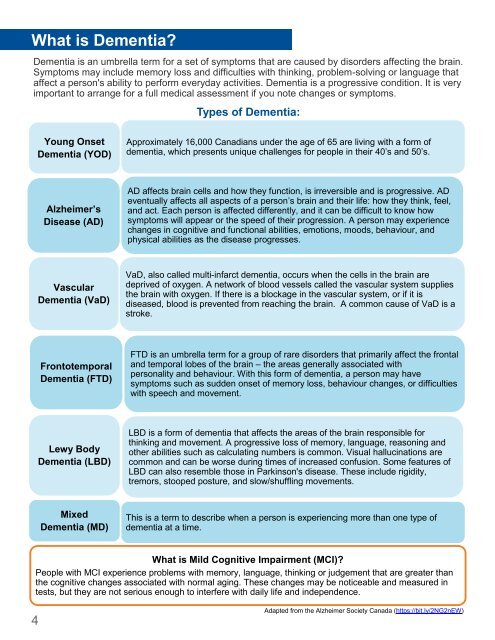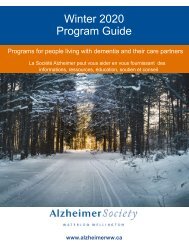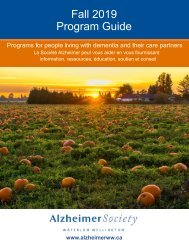ASWW Spring & Summer 2019 Program Guide
You also want an ePaper? Increase the reach of your titles
YUMPU automatically turns print PDFs into web optimized ePapers that Google loves.
What is Dementia?<br />
Dementia is an umbrella term for a set of symptoms that are caused by disorders affecting the brain.<br />
Symptoms may include memory loss and difficulties with thinking, problem-solving or language that<br />
affect a person's ability to perform everyday activities. Dementia is a progressive condition. It is very<br />
important to arrange for a full medical assessment if you note changes or symptoms.<br />
Types of Dementia:<br />
Young Onset<br />
Dementia (YOD)<br />
Approximately 16,000 Canadians under the age of 65 are living with a form of<br />
dementia, which presents unique challenges for people in their 40’s and 50’s.<br />
Alzheimer’s<br />
Disease (AD)<br />
AD affects brain cells and how they function, is irreversible and is progressive. AD<br />
eventually affects all aspects of a person’s brain and their life: how they think, feel,<br />
and act. Each person is affected differently, and it can be difficult to know how<br />
symptoms will appear or the speed of their progression. A person may experience<br />
changes in cognitive and functional abilities, emotions, moods, behaviour, and<br />
physical abilities as the disease progresses.<br />
Vascular<br />
Dementia (VaD)<br />
VaD, also called multi-infarct dementia, occurs when the cells in the brain are<br />
deprived of oxygen. A network of blood vessels called the vascular system supplies<br />
the brain with oxygen. If there is a blockage in the vascular system, or if it is<br />
diseased, blood is prevented from reaching the brain. A common cause of VaD is a<br />
stroke.<br />
Frontotemporal<br />
Dementia (FTD)<br />
FTD is an umbrella term for a group of rare disorders that primarily affect the frontal<br />
and temporal lobes of the brain – the areas generally associated with<br />
personality and behaviour. With this form of dementia, a person may have<br />
symptoms such as sudden onset of memory loss, behaviour changes, or difficulties<br />
with speech and movement.<br />
Lewy Body<br />
Dementia (LBD)<br />
LBD is a form of dementia that affects the areas of the brain responsible for<br />
thinking and movement. A progressive loss of memory, language, reasoning and<br />
other abilities such as calculating numbers is common. Visual hallucinations are<br />
common and can be worse during times of increased confusion. Some features of<br />
LBD can also resemble those in Parkinson's disease. These include rigidity,<br />
tremors, stooped posture, and slow/shuffling movements.<br />
Mixed<br />
Dementia (MD)<br />
This is a term to describe when a person is experiencing more than one type of<br />
dementia at a time.<br />
What is Mild Cognitive Impairment (MCI)?<br />
People with MCI experience problems with memory, language, thinking or judgement that are greater than<br />
the cognitive changes associated with normal aging. These changes may be noticeable and measured in<br />
tests, but they are not serious enough to interfere with daily life and independence.<br />
4<br />
Adapted from the Alzheimer Society Canada (https://bit.ly/2NG2nEW)

















